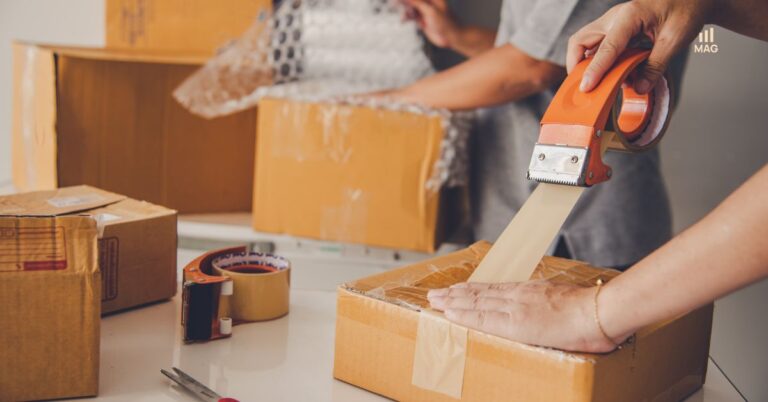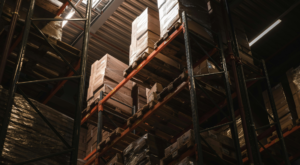
The end of FBA prep services represents a major operational shift, making third-party prep centers an essential component for sellers needing to avoid shipment rejections and compliance issues after the January 1, 2026 cutoff.
Amazon has confirmed the end of its FBA prep services, a change that will take full effect at the start of 2026. This policy shift forces thousands of sellers to find an immediate alternative for their product prep and labeling.
Ignoring this change is not an option, as it directly impacts your supply chain’s compliance and efficiency. The challenge is finding a trustworthy solution amid a sudden surge in demand for outside prep services.
This move creates a massive opportunity within the third-party logistics (3PL) sector, a market projected to reach $1.87 trillion by 2030. Understanding how to find the right 3PL partner is now essential for every seller to continue operating smoothly.
End of FBA Prep and Labeling Services in 2026
Vanessa Hung, CEO of Online Seller Solutions"Amazon doesn’t want to slow down fulfillment operations with tasks it considers your responsibility."
According to reports from industry sources like Supply Chain Dive, Amazon will officially end its FBA prep and item labeling services in the United States. The policy change will take full effect for all new shipments created on or after January 1, 2026.
This update applies comprehensively to all inventory sent to US fulfillment centers, impacting standard FBA shipments as well as those sent through other programs. All products must arrive at Amazon facilities fully prepped and labeled by the seller or a designated third party.
After the deadline, shipments arriving without the required prep work will no longer be eligible for reimbursement if damaged or deemed untraceable. This shift places the full responsibility for packaging and labeling compliance directly onto the seller.
Amazon has clarified that a grace period exists for shipments created before the January 1, 2026 cutoff. The company will still process the prep for those specific shipments even if they arrive in early 2026.
The company stated that this decision was made because sellers’ packaging capabilities have improved significantly over time. This change allows Amazon’s fulfillment centers to focus on their core function of providing faster and more efficient operations.
Navigating the FBA Prep Shutdown, What are Your Options and Next Steps
With the upcoming halt of Amazon’s fee-based prep services, analysis from sources like eFulfillment Service highlights several paths forward for sellers. The core responsibility for all prep work, from FNSKU labeling to poly-bagging, now shifts entirely to the seller.
One option is to bring all preparation work in-house, giving sellers full control over the process. However, this path requires significant resources, including physical space, equipment, and trained labor, and introduces the risk of costly mistakes.
Key in-house responsibilities would include:
- Inspecting, packaging, and labeling every unit to meet strict FBA standards.
- Stocking all necessary supplies like bubble wrap, barcode printers, and poly bags.
- Training staff on precise FBA rules, a process often guided by an Amazon agency to ensure alignment with the latest policy updates.
For many, outsourcing to a professional third-party logistics (3PL) prep center is a more practical solution. These services are designed to handle all Amazon-required tasks and forward compliant shipments directly to fulfillment centers.
The primary benefits of using a 3PL include:
- Reducing the risk of non-compliance fees or shipment delays.
- Eliminating the need to learn and adapt to Amazon’s evolving prep rules.
- Allowing sellers to focus on scaling their business instead of logistics.
When choosing a 3PL Amazon prep service provider, vet them based on these key criteria:
- Amazon Expertise – must have a proven track record of handling specific FBA requirements, including FNSKU labeling, bundling, and compliance checks.
- Technology Platform – should offer a robust technology platform that provides clear visibility and management of your inventory.
- Transparent Pricing –clear, upfront pricing structure with no hidden fees.
- Customer Support – should be known for offering responsive and excellent communication.
- Strategic Location – Proximity to key Amazon fulfillment centers can help reduce inbound shipping times and costs.
- Range of Services – a comprehensive set of services that match your needs, such as kitting, quality inspections, or returns processing.
What This Change Really Means for Sellers
The decision to end FBA prep services marks a significant operational shift with several critical implications for sellers.
- The Biggest Risk Is Financial, Not Operational
The most pressing concern is the new policy on reimbursements. With Amazon stating that improperly prepped items won’t be reimbursed if lost or damaged, this may create a loophole for Amazon to deny claims for the 1-5% of inventory that is commonly lost during the receiving process.
- Efficiency Gains Are Unlikely
Amazon’s claim that this will make fulfillment centers faster is doubtful. Given that Amazon says the “vast majority” of sellers already handle their own prep, and receiving times are already at a record high of 30-90+ days, removing this service for a minority of sellers is unlikely to improve overall efficiency.
- New Sellers Face a Steeper Learning Curve
The all-in-one ability to send, prep, and sell from one platform was a major draw for new entrepreneurs. This change removes a key feature that simplified the entry process, creating a new logistical hurdle for those just starting on the platform.
- This Marks the End of Amazon’s Original “All-in-One” FBA Promise
The prep service was a foundational aspect of what made FBA revolutionary, setting it apart from other marketplaces. Its removal signals a significant departure from the original model where Amazon handled nearly every aspect of fulfillment.
- Amazon’s Current Performance Doesn’t Inspire Confidence
Sellers already report that getting help from Seller Support for relabeling issues is nearly impossible. Amazon’s existing struggles in this area suggest that shifting the entire responsibility to sellers will not be a seamless transition.
- The Policy Change Is Comprehensive
This update is not limited to standard FBA shipments. It impacts all of Amazon’s logistics programs, including Amazon Warehousing & Distribution (AWD) and Amazon Global Logistics (AGL), meaning there is no alternative Amazon-run service to fall back on.
Forest Shipping"For newer or smaller sellers, the removal of in-house support means higher costs and operational adjustments."






